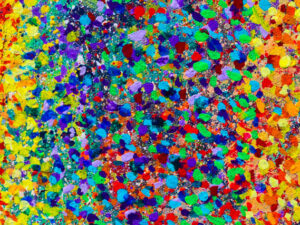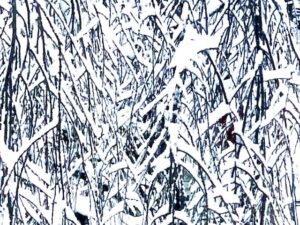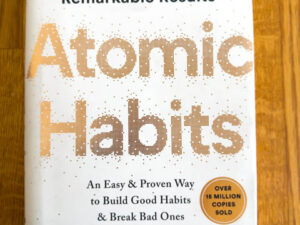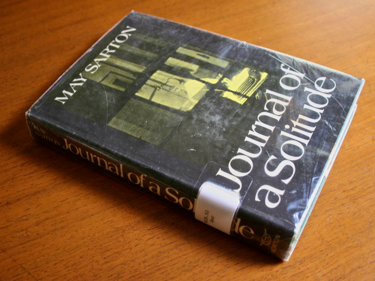
I loved this book and give it five stars. I heard a retrospective on NPR of their best interviews with writers, and that is where I first heard of May Sarton. I liked what she said in the interview, so I looked her up. She is the author of 48 books of poetry, fiction and non-fiction!
This book, published in 1973, explores her personal life of gardening, flowers, weather, writing, introspection, interaction with animals and birds, woman’s liberation, reading and being contemplative. I liked this book much better than her poetry, although she valued her poetry more. (I read two volumes of her poems which are pictured below.) There were so many bits I wanted to recall from this journal of hers that I have typed out quite a few, trying to group them somewhat by category. I believe her own words will best describe what I cherished in this volume.
Stellar description:
“It is beautiful to have spring flowers in the house when it is so terribly cold outside — a glittering day, the sky has the piercing blue of the stained-glass windows at Chartres.”
“The habitation reflected in a very special way the tone, the hidden music, as it were, of a woman… the sense of a deep loam of experience and taste expressed in the surroundings, the room a shell that reverberated with oceans and tides and waves of the owner’s past, the essence of a human life as it had lived itself into certain colors, and especially into many books…”
“the woods, punctuated by birdsong…”
“The stars were huge, like daisies through the windowpanes.”
[A nursing home an] “atmosphere of lies and of neglect, a place where more than one child has simply abandoned a senile parent, buried him alive.”
“It is snowing hard, a blizzard. What a relief it is after the cruel shining of these past weeks, how gentle and enclosing! It has become exhausting to live as we did in the center of a diamond, light reflected from snow, and no shade or shelter.”
“Here is a personal largess, a largess of giving to life in every possible way, that makes her presence itself a present. Perhaps the key is her capacity to make herself available on any day, any time, to whatever human joy or grief longs to be fulfilled or assuaged by sharing… The participation is never passive, shot through with a sudden gust of laughter as it often is, always vivid and original. [She] lives each moment of the day as if it were the first and the last, with the whole of herself.”
“Roses tumble about in opulent clouds these days.”
On love:
“The French have always known that our capacity for loving mellows and ripens, and love if it is any good at all gets better with age.”
“Love is one of the great enlargers of the person because it requires us to ‘take in’ the stranger and to understand him, and to exercise restraint and tolerance as well as imagination to make the relationship work.”
“… clutching is the surest way to murder love….”
On art, writing and creativity:
“If art is not to be life-enhancing, what is it to be?”
“I have felt that the work of art, a kind of dialogue between me and God, must represent resolution rather than conflict.”
“Why is it that poetry always seems to me so much more a true work of the soul than prose? Perhaps it is that prose is earned and poetry is given.”
About Virginia Woolf, “What remains true is that one cannot pick up a single one of her books and read a page without feeling more alive.”
“Louis Armstrong… Something shone from that man, a rare thing, a real joy. It is becoming exceedingly rare among artists of any kind. And I have an idea that those who can and do communicate it are always people who have had a hard time.”
“We can do anything, or almost, but how balanced, magnanimous, and modest one has to be to do anything! And how patient! It is as true in the arts as anywhere else.”
“Perhaps we write toward what we will become from where we are.”
On women/men:
“I have an idea that women are far more interested in self-actualization than men are.”
“…it is the masculine in a woman and the feminine in a man that proves creative. …we should place all human lives in a spectrum with the very masculine man at one end and the very feminine woman at the other and then every gradation toward the middle… and then the people of the greatest creativity and force, as well as the greatest understanding, come near the middle of the spectrum.”
On God:
”Simone Weil says, ‘Absolute attention is prayer.’ And the more I have thought about this over the years, the truer it is for me. We are aware of God only when we cease to be aware of ourselves, not in the negative sense of denying the self, but in the sense of losing self in admiration and joy.”
On money:
“Being very rich so far as I am concerned is having margin. The margin is being able to give.”
“This kind of open-ended time is the only luxury that really counts and I feel stupendously rich to have it.”
“I believe [money] must flow through me as food does, be spent as it is earned, be given away, be turned into flowers and books and beautiful things, be given to people who are creators or in need, never to be counted except as what it is — a counter against more life of one kind or another. It must remain convertible, not allowed to lie fallow.”
Other quips:
“A sturdy plant is a great comfort.”
Suicide is a “fantasy of revenge.”
“It is restful to imagine expression without words.”
“I too have imagined I was giving when I was battering at someone for attention.”
“One must think like a hero to behave like a merely decent human being.”
“Time unbounded is hard to handle.”
“A house that does not have one worn, comfy chair in it is soulless.”
“Growth is demanding and may seem dangerous… but why go on living if one has ceased to grow?”
“Clutter is what silts up exactly like silt in a flowing stream when the current, the free flow of the mind, is held up by an obstruction. I feel cluttered when there is no time to analyze experience.. That is the silt — unexplored experience that literally chokes the mind.”
“What is destructive is impatience, haste, expecting too much too fast.”
“I see my function as quietly destroying myths, … in order to come closer and closer to reality and accepting reality.”
“I always come back to the same necessity: go deep enough and there is a bedrock of truth, however hard.”
“I have been trying to say radical things gently so that they may penetrate without shock.”
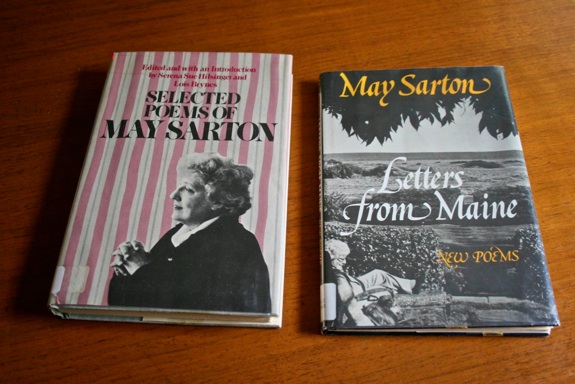
1 Comment
Pingbacks
-
[…] One of the features of one of the libraries I frequent is there is a “staff recommends” table. I always browse it. There are usually newer, popular books there, so when an older one shows up, I take particular notice, since someone had to venture off the path and really like one, to put it there when it is no longer part of the current conversation. This book I found there and I was drawn to it; I immediately picked it up because I had previously read and loved this author’s Journal of a Solitude, giving it five stars. […]
